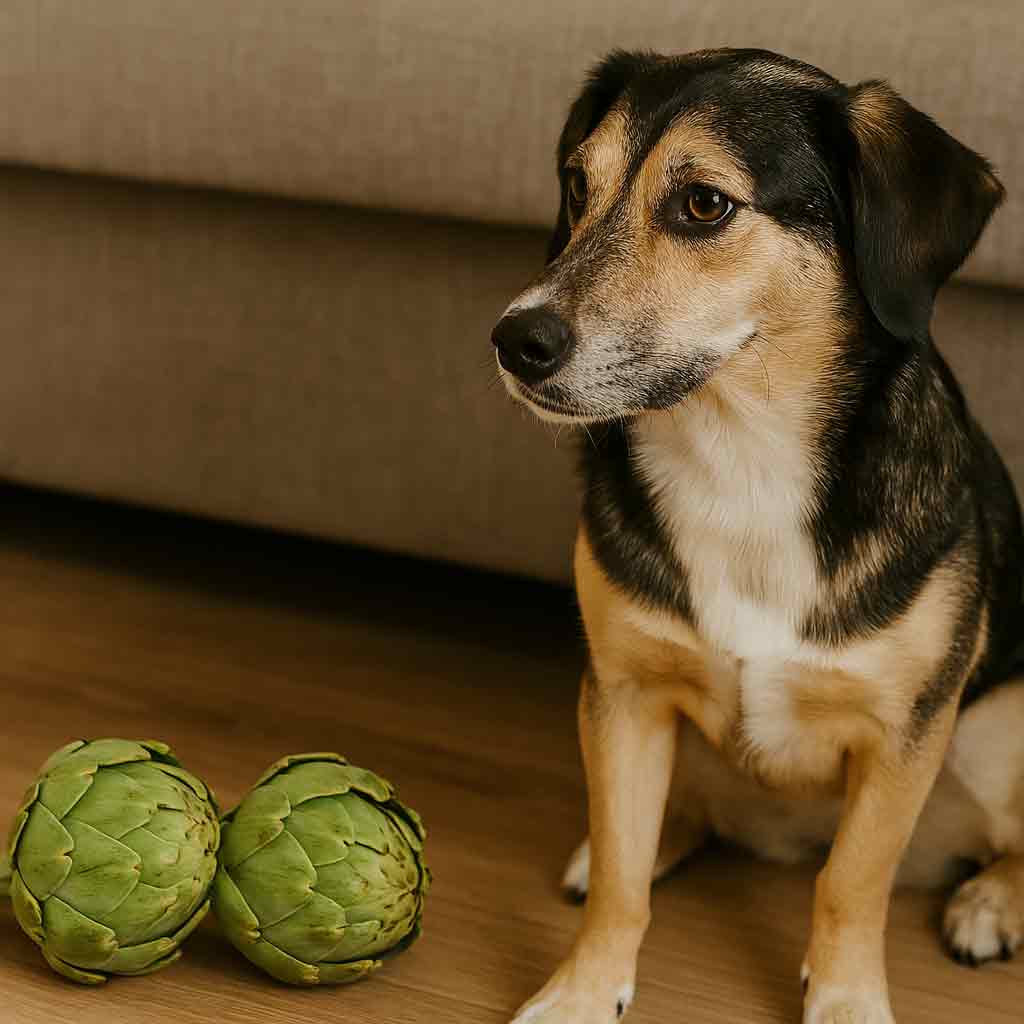Can Dogs Have Artichokes? Benefits, Potential Risks & Safer Alternatives
Table of Contents
- 1. Introduction
- 2. What Are Artichokes?
- 3. Can Dogs Eat Artichokes?
- 4. Health Benefits of Artichokes for Dogs
- 5. Potential Risks of Feeding Artichokes to Dogs
- 6. How to Safely Serve Artichokes to Your Dog
- 7. Can Dogs Eat Cooked, Raw, or Canned Artichokes?
- 8. How Much Artichoke Can Dogs Eat?
- 9. Signs of an Allergic Reaction or Digestive Issue
- 10. Healthy Alternatives to Artichokes
- 11. FAQs About Dogs and Artichokes
- 12. Final Thoughts: Should You Feed Your Dog Artichokes?
- 13. Key Takeaways
1. Introduction
As pet parents, we constantly evaluate what foods are safe and healthy for our dogs. While some vegetables make great dog-friendly snacks, others can be questionable. One vegetable that often raises curiosity is the artichoke. Can dogs have artichokes? The short answer is yes—artichokes are safe for dogs when served properly. But like any human food, there are important considerations before adding them to your pup’s bowl.
In this article, we’ll break down the nutritional benefits, risks, and best practices for feeding artichokes to dogs, so you can make an informed decision.
2. What Are Artichokes?
Artichokes are a type of thistle plant grown for their edible flower buds. Typically steamed or boiled, artichokes are nutrient-dense and high in fiber, antioxidants, and vitamins. They’re considered a superfood for humans—but what about our four-legged companions?
3. Can Dogs Eat Artichokes?
Yes, dogs can eat artichokes in moderation. When served plain and cooked properly, artichokes can be a nutritious addition to your dog’s diet. They’re non-toxic and contain a wealth of vitamins and minerals that can support your dog’s health.
However, there are some important guidelines to follow regarding preparation and portion size.
4. Health Benefits of Artichokes for Dogs
Artichokes are packed with nutrients that may benefit dogs in several ways:
1. Rich in Antioxidants
Artichokes contain phytonutrients like quercetin and rutin, which may help reduce inflammation and improve heart health.
2. Supports Digestive Health
The high fiber content in artichokes can support healthy digestion and bowel movements. This is particularly helpful for dogs with irregular stools.
3. Good Source of Vitamins
Artichokes are rich in Vitamin C, Vitamin K, folate, and magnesium—nutrients that support immune function, blood clotting, and energy production.
4. Liver Support
Some studies suggest that artichokes may support liver function by promoting detoxification.
5. Potential Risks of Feeding Artichokes to Dogs
While artichokes can be beneficial, there are potential risks if they’re not served properly:
1. Choking Hazard
Artichoke leaves are fibrous and tough, especially when raw. Large chunks can pose a choking risk or cause digestive blockages.
2. Digestive Upset
Introducing too much fiber too quickly can cause gas, bloating, or diarrhea. Always start with small amounts.
3. Added Ingredients
Many artichoke dishes include garlic, onion, butter, or salt—all of which are harmful to dogs. Only serve artichokes plain.
4. Allergic Reactions
Though rare, some dogs may be allergic or sensitive to artichokes. Watch for itching, swelling, or digestive issues after introducing them.
6. How to Safely Serve Artichokes to Your Dog
To ensure safety and maximize nutritional value:
- Wash thoroughly to remove any pesticides or dirt
- Trim away sharp outer leaves and tough stems
- Cook the artichoke by steaming or boiling (no seasoning)
- Chop into bite-sized pieces for easier digestion
- Serve in moderation as an occasional treat
Avoid fried, pickled, marinated, or canned artichokes that contain preservatives or added sodium.
7. Can Dogs Eat Cooked, Raw, or Canned Artichokes?
Cooked Artichokes
Steamed or boiled artichokes are the best option. Cooking softens the tough fibers, making them easier to digest.
Raw Artichokes
Raw artichokes are not toxic, but they are harder to digest and can pose a choking hazard. Only offer small, tender pieces if feeding raw.
Canned or Marinated Artichokes
Avoid these entirely. They often contain salt, garlic, oil, vinegar, or preservatives—all of which can be harmful to dogs.
8. How Much Artichoke Can Dogs Eat?
Always follow the rule of moderation. Artichokes should not replace a balanced dog diet but can be used as a supplement or occasional treat.
- Small dogs: 1–2 teaspoons
- Medium dogs: 1–2 tablespoons
- Large dogs: Up to 1/4 cup
Start small and observe how your dog reacts before increasing portions.

9. Signs of an Allergic Reaction or Digestive Issue
After introducing artichokes, watch for the following symptoms:
- Vomiting or diarrhea
- Excessive gas or bloating
- Itchy skin or ears
- Swelling of the face or paws
- Lethargy or change in behavior
If you notice any of these signs, discontinue artichokes and consult your vet.
10. Healthy Alternatives to Artichokes
If your dog doesn’t take to artichokes or shows signs of sensitivity, here are some other dog-safe vegetables to consider:
- Green beans
- Carrots
- Sweet potatoes (cooked, no skin)
- Pumpkin (plain, canned)
- Zucchini
These alternatives are easier to digest and offer similar health benefits.
11. FAQs About Dogs and Artichokes
Can dogs eat artichoke hearts?
Yes, plain cooked artichoke hearts are safe and easier to digest than the leaves.
Can puppies have artichokes?
Puppies have more sensitive stomachs. It’s best to avoid feeding artichokes to puppies unless approved by your veterinarian.
Can dogs eat Jerusalem artichokes?
Jerusalem artichokes (sunchokes) are different from globe artichokes and contain inulin, which can cause gas. Feed only in small amounts.
Are grilled artichokes safe for dogs?
Only if they’re grilled plain, without oil, garlic, or seasonings.
12. Final Thoughts: Should You Feed Your Dog Artichokes?
So, can dogs have artichokes? Yes, when prepared properly and fed in moderation, artichokes can be a healthy and tasty treat for dogs. They offer fiber, vitamins, and antioxidants—but they must be served plain and without seasonings.
As with all new foods, start small and monitor your dog’s reaction. When in doubt, consult your veterinarian to determine what’s best for your pup.
13. Key Takeaways
- Dogs can safely eat plain, cooked artichokes in moderation.
- Avoid raw, canned, or seasoned varieties.
- Watch for digestive issues or allergic reactions.
- Always introduce new foods gradually.
- Artichokes are a nutritious supplement, not a dietary staple.
When prepared correctly, artichokes can be a healthy and enjoyable addition to your dog’s occasional snack list!







